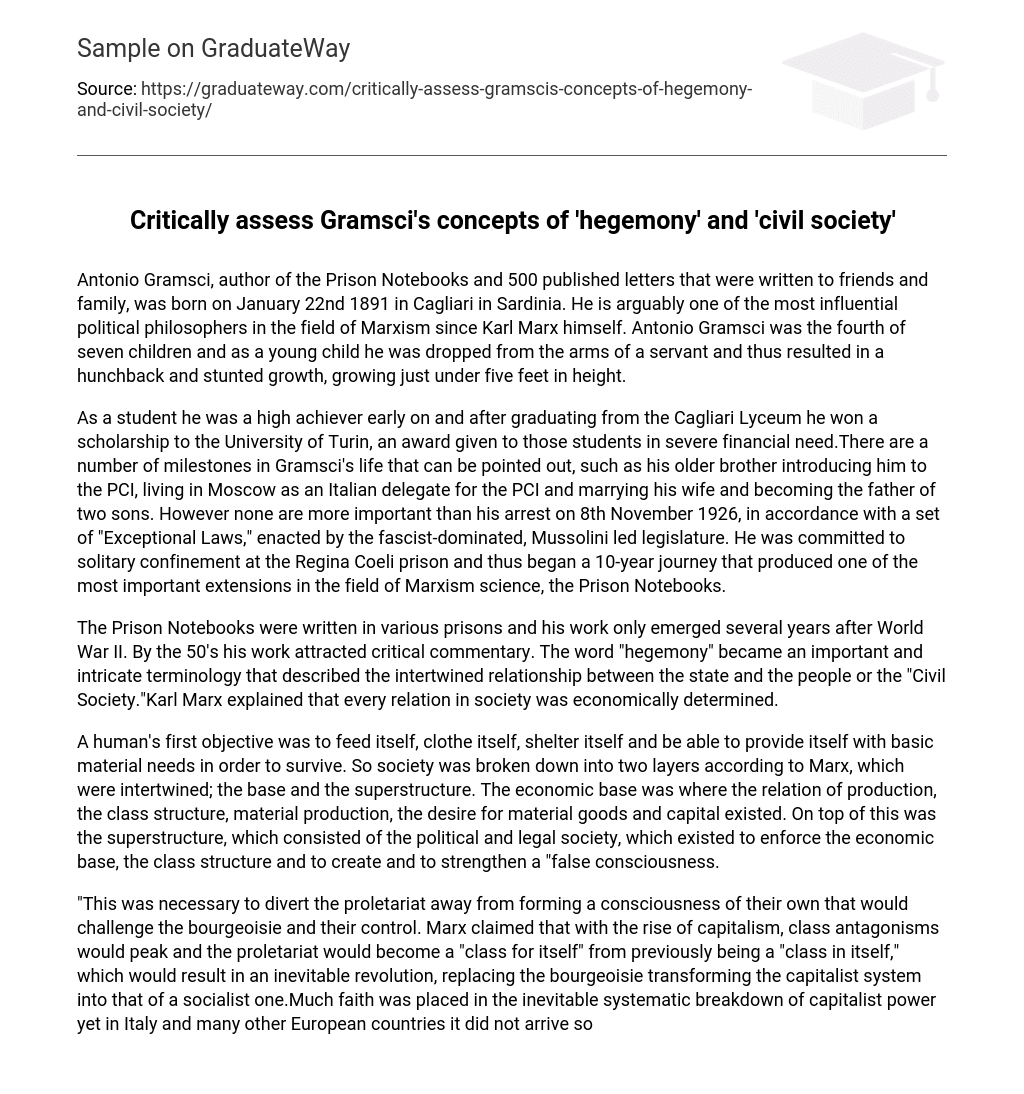Antonio Gramsci, author of the Prison Notebooks and 500 published letters that were written to friends and family, was born on January 22nd 1891 in Cagliari in Sardinia. He is arguably one of the most influential political philosophers in the field of Marxism since Karl Marx himself. Antonio Gramsci was the fourth of seven children and as a young child he was dropped from the arms of a servant and thus resulted in a hunchback and stunted growth, growing just under five feet in height.
As a student he was a high achiever early on and after graduating from the Cagliari Lyceum he won a scholarship to the University of Turin, an award given to those students in severe financial need.There are a number of milestones in Gramsci’s life that can be pointed out, such as his older brother introducing him to the PCI, living in Moscow as an Italian delegate for the PCI and marrying his wife and becoming the father of two sons. However none are more important than his arrest on 8th November 1926, in accordance with a set of “Exceptional Laws,” enacted by the fascist-dominated, Mussolini led legislature. He was committed to solitary confinement at the Regina Coeli prison and thus began a 10-year journey that produced one of the most important extensions in the field of Marxism science, the Prison Notebooks.
The Prison Notebooks were written in various prisons and his work only emerged several years after World War II. By the 50’s his work attracted critical commentary. The word “hegemony” became an important and intricate terminology that described the intertwined relationship between the state and the people or the “Civil Society.”Karl Marx explained that every relation in society was economically determined.
A human’s first objective was to feed itself, clothe itself, shelter itself and be able to provide itself with basic material needs in order to survive. So society was broken down into two layers according to Marx, which were intertwined; the base and the superstructure. The economic base was where the relation of production, the class structure, material production, the desire for material goods and capital existed. On top of this was the superstructure, which consisted of the political and legal society, which existed to enforce the economic base, the class structure and to create and to strengthen a “false consciousness.
“This was necessary to divert the proletariat away from forming a consciousness of their own that would challenge the bourgeoisie and their control. Marx claimed that with the rise of capitalism, class antagonisms would peak and the proletariat would become a “class for itself” from previously being a “class in itself,” which would result in an inevitable revolution, replacing the bourgeoisie transforming the capitalist system into that of a socialist one.Much faith was placed in the inevitable systematic breakdown of capitalist power yet in Italy and many other European countries it did not arrive so readily other than Bolshevik Russia in 1917, and the people accepted Mussolini and fascism. Gramsci tried to explain why the revolution had not occurred.
He stated that the bourgeoisie was able to exercise control in society because it had intellectual and moral leadership along with economic domination. This intellectual and moral leadership came in the form of hegemony.This means that the dominant class in society is able to project their political, moral and cultural values onto the rest of the population. This meant that every contact with anyone in people’s daily life enhanced and enforced the ideology spread by agents of the bourgeoisie.
The agents would be members of the Civil Society such as teachers, lawyers, politicians, the media and so on. In short, Gramsci drew a distinction between the political state with its powers clearly vested in government, armies, and police and the cultural institutions that belonged to civil society and were connected to the state in a more subtle fashion.Gramsci believed that for the ruling class to control its subjects through overt, direct coercion was possible it would not be able to maintain it through armed force and state power forever. Otherwise the state would be stuck in a continuous revolution, with each ruling class being challenged and so would result in less profit and insecurity for the capitalist.
Instead the bourgeoisie has to create a legitimacy in order to stay in power and project their values onto the “ignorant masses,” who as Chomsky says “have to be marginalised, diverted…for their own good.
“The concept of “hegemony” is closely related to civil society. Gramsci proposed that the powers-that-be work to maintain the consent of the governed through hegemony, creation of a cultural milieu that defines “common sense”. By influencing the institutions of civil society, the state creates a collective culture or common sense that lead the masses to accept the state and its authority to govern.To use an everyday example, by creating a stirring National Anthem, and making sure it is taught in all the schools at an early age, the state begins to create a cultural hegemony that leads to strong nationalistic feelings among the future working class.
These nationalist feelings helps keep revolutionary fervor in check, and suppresses any sparks of Marxist worker revolts where politicians can state that these sorts of revolts are unpatriotic. There are many other mediums through which the dominant ideology can be practiced and spread so that it becomes to be understood as common sense. In America at the moment, Fox News journalists and newsreaders are seen more as political activists for the Republican Party and a megaphone for politicians who align themselves with that party, rather than simply reporters of the news.





